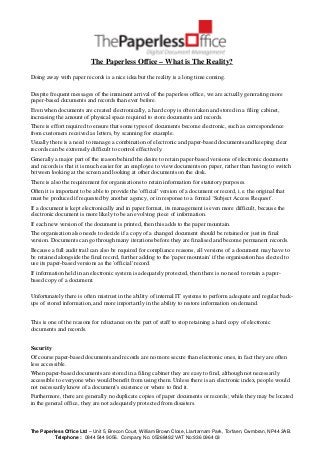
A paperless office reality
- 1. The Paperless Office – What is The Reality? Doing away with paper records is a nice idea but the reality is a long time coming. Despite frequent messages of the imminent arrival of the paperless office, we are actually generating more paper-based documents and records than ever before. Even when documents are created electronically, a hard copy is often taken and stored in a filing cabinet, increasing the amount of physical space required to store documents and records. There is effort required to ensure that some types of documents become electronic, such as correspondence from customers received as letters, by scanning for example. Usually there is a need to manage a combination of electronic and paper-based documents and keeping clear records can be extremely difficult to control effectively. Generally a major part of the reason behind the desire to retain paper-based versions of electronic documents and records is that it is much easier for an employee to view documents on paper, rather than having to switch between looking at the screen and looking at other documents on the desk. There is also the requirement for organisations to retain information for statutory purposes. Often it is important to be able to provide the 'official' version of a document or record, i.e. the original that must be produced if requested by another agency, or in response to a formal ‘Subject Access Request’. If a document is kept electronically and in paper format, its management is even more difficult, because the electronic document is more likely to be an evolving piece of information. If each new version of the document is printed, then this adds to the paper mountain. The organisation also needs to decide if a copy of a changed document should be retained or just its final version. Documents can go through many iterations before they are finalised and become permanent records. Because a full audit trail can also be required for compliance reasons, all versions of a document may have to be retained alongside the final record, further adding to the 'paper mountain' if the organisation has elected to use its paper-based versions as the 'official' record. If information held in an electronic system is adequately protected, then there is no need to retain a paper- based copy of a document. Unfortunately there is often mistrust in the ability of internal IT systems to perform adequate and regular back- ups of stored information, and more importantly in the ability to restore information on demand. This is one of the reasons for reluctance on the part of staff to stop retaining a hard copy of electronic documents and records. Security Of course paper-based documents and records are no more secure than electronic ones, in fact they are often less accessible. When paper-based documents are stored in a filing cabinet they are easy to find, although not necessarily accessible to everyone who would benefit from using them. Unless there is an electronic index, people would not necessarily know of a document's existence or where to find it. Furthermore, there are generally no duplicate copies of paper documents or records; while they may be located in the general office, they are not adequately protected from disasters. The Paperless Office Ltd – Unit 5, Brecon Court, William Brown Close, Llantarnam Park, Torfaen, Cwmbran, NP44 3AB. Telephone : 0844 544 9056. Company No. 05268492 VAT No:936 0964 03
- 2. Once the filing cabinet is full, documents are typically put into storage, such as a basement or warehouse, which makes it time-consuming to retrieve. However, they are generally better protected against disasters if stored off-site. Physical documents that are retained need to be protected, because they are normally not duplicated. This means putting in place elaborate measures, such as humidity control, and gas-based sprinkler systems, in addition to the physical security methods to prevent the loss or theft of sensitive content — particularly pertinent to the Public Sector. The use of a warehouse, while affording better disaster recovery provision, does not necessarily improve accessibility. If multiple documents are required for litigation or compliance it is costly and time-consuming to retrieve them, particularly if there is no documented indexing system. Most organisations do not know what paper-based documents they have, particularly if their 'archives' go back ten or 20 years. Organisations should consider retaining only historical, paper-based documents that have value to the organisation itself or the public sector as a whole, unless of course they are required for compliance purposes. A sensible approach for organisations that generate large volumes of paper-based documents is to consider adopting a DRM system. To be effective, this must be supported by adequate disaster recovery provision to ensure that employees do not feel the need to print paper copies of electronically stored documents and records. A single commonly accessible system for the retrieval and discovery of documents can often justify the cost of such an electronic system. The Paperless Office Limited (TPO) TPO are expert in and focus on the distribution of electronic documents via the Web, providing E-archiving and E-invoicing solutions to businesses of all sizes operating in variety of industries. Our services range from simple document scanning, archiving and retrieval through to automated capture and indexing of complete document sets with secure, 24/7 access available for all the players in the information chain. Our solutions are scalable and are implemented quickly, without the need to alter existing IT systems and are suitable for all manner of documents. In addition no capital outlay is required and many solutions are available based upon “Pay As You Go” pricing. For further information on how TPO can reduce your costs contact us by Email sales@the-paperless-office.com The Paperless Office Ltd – Unit 5, Brecon Court, William Brown Close, Llantarnam Park, Torfaen, Cwmbran, NP44 3AB. Telephone : 0844 544 9056. Company No. 05268492 VAT No:936 0964 03
